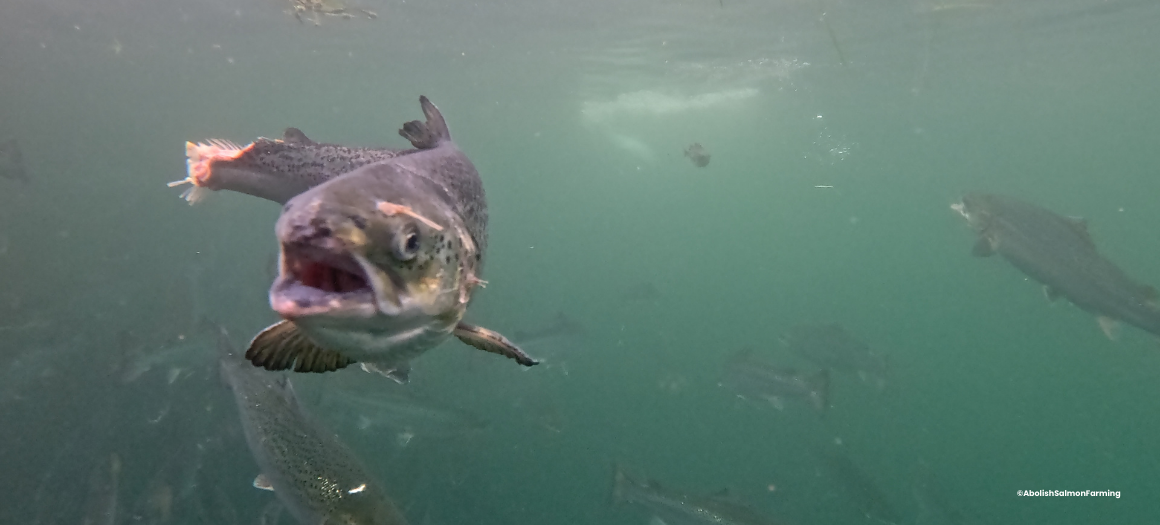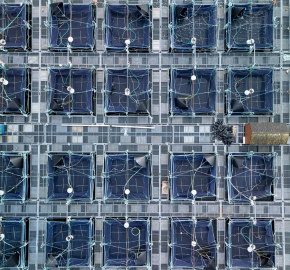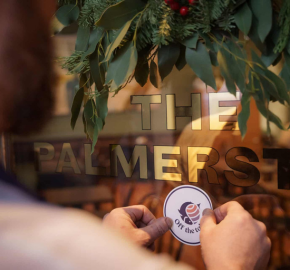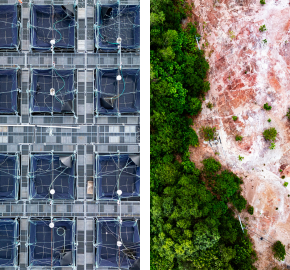WildFish exposes the industry’s efforts to obscure the true impacts of salmon farming in Scotland

New WildFish Scottish salmon farming: Harvesting, sea lice and disease report finds salmon industry using loopholes to obscure the true impacts of salmon farming
- Our investigation finds industry leaders such as Loch Duart are failing to take decisive action on sea lice and disease at their farms – with cumulative mortality rates of almost 25% across the industry.
- Loch Duart is often name-checked on high-end menus and at international events, including the United Nations Climate Change Conference (COP26) in Glasgow.
- Report reveals possible link between Loch Duart farms with high levels of sea lice, disease and fish mortality, and the farmed salmon served at the international event in November 2021.
- Our report also shows widespread use of companies failing to report sea lice levels, as required by law, using a reporting loophole – in addition to industry players harvesting diseased fish over a prolonged period of time.
- Not only does this represent a significant risk to wild fish, but it also reveals severe welfare and environmental concerns, and raises questions and doubts about industry claims of “responsible” salmon farming practices.
- WildFish today launches its new campaign Off the table, calling on chefs and restaurants to remove farmed salmon from their menus.
WildFish’s new report, published today, reveals how the Scottish salmon farming industry is exploiting the use of ‘harvesting’ (fish slaughter), both in its mandatory reporting and as a disease management technique, and how this misuse is impacting on the environment, fish welfare, and the salmon entering the food chain across the UK and beyond.
Based on publicly-available data, the investigation by UK charity WildFish pieces together reporting to both the Scottish Environment Protection Agency (SEPA) and the Fish Health Inspectorate, to show the true picture of an industry that is failing to control parasites and diseases on its farms or maintain adequate conditions for keeping fish healthy (with average mortality rates of 24.1%) whilst appearing to conceal the true extent of these failures.
The report finds that the true lice burdens on many Scottish salmon farms are likely being under-reported by the industry, and finds multiple instances of farms avoiding reporting weekly average lice counts for up to one third of a production cycle. It also finds multiple examples of fish being harvested from farms suffering from disease over prolonged periods of up to five months, with mortality rates significantly above the industry average (over 50%).
“Our report paints a shocking picture of what is happening on salmon farms in Scotland – with one in four fish dying prematurely, and sea lice parasites proliferating in huge numbers. This has a serious impact on the surrounding environment, and wild fish populations – not to mention it being at odds with the image presented publicly by the salmon farming industry.”
Dr Matt Palmer
Farmed Salmon Campaign Manager, WildFish (report author)
WildFish today launches a new campaign, Off the table, which aims to raise awareness of the high environmental, welfare and sustainability impacts of open-net salmon farming in Scotland amongst the catering and hospitality sectors. The charity is calling on chefs and restaurants across the UK to pledge to remove farmed salmon from their menus.
“Salmon farming is destroying wild salmon, sea trout and the environment. This report demonstrates how inherently unsustainable open-net salmon farming is, and highlights why our new campaign is calling on chefs and diners to take farmed salmon off the table.”
Nick Measham
CEO, WildFish
Case studies – sea lice
Since March 2021, it has been a legal requirement for every active marine open-net salmon farm to submit weekly sea lice counts to the Scottish Government. These parasitic sea lice graze on the salmon’s skin, causing pain, suffering and in some cases death. As they build up on salmon farms, they transfer to, and can kill, juvenile wild salmon and trout.
Failure to appropriately and accurately monitor sea lice levels on Scottish salmon farms risks the health and welfare on both farmed and wild fish. Despite this, farms are able to withhold reporting for a number of reasons – one of which is “withdrawal period prior to harvest”. This report details the extensive industry-wide use of the mitigation to avoid reporting on weekly sea lice levels – often in cases where the lice count in the preceding weeks was high.
- Hunda Farm (Orkney), Scottish Sea Farms – gave no count for 25 weeks of its most recent single production cycle, instead stating “withdrawal prior to harvesting” – equivalent to one third of the total production cycle of up to 1679.7 tonnes of Atlantic farmed salmon. Given the size of this farm, approximately 250,000 harvest size fish, even a low lice burden during this time has the potential for significantly increasing lice loads within the water body.
- Bastaness Farm, Cooke Aquaculture – reported sea lice levels in 2021 above the threshold for increased monitoring by Marine Scotland for 4 consecutive weeks (3.44, 3.50, 4.49, 4.39) – then switched to ‘withdrawal prior to harvesting’ for the next 5 weeks.
- South Sound Farm, Scottish Sea Farms, reported only 5 weekly average lice counts in 13 weeks in 2021, before switching to “withdrawal prior to harvesting” for a further 8 weeks. The reported lice counts were high (2.47 and 2.88) despite physical delicing taking place – representing 22 weeks in total in which average sea lice levels were inappropriately monitored, under-reported and potentially poorly controlled
Case studies – disease
Disease is one of the leading causes of high mortality rates reported in Scottish farmed salmon. When deployed rapidly, harvesting can prevent ongoing suffering and curb environmental impacts of disease and/or sea lice infestations. However, this report finds that the industry is inappropriately using targeted harvesting of diseased pens over a prolonged period of many weeks, under the guise of ‘welfare’ or ‘reducing biomass’.
- Eport Outer, Bakkafrost (formerly The Scottish Salmon Company) – delayed the harvesting of fish by eight weeks, despite the population on site having tested positive for amoebic gill disease (AGD) – allowing time for increased growth of the fish from 3.9kg, to closer to the industry’s average harvest size of 5.5kg.
- Clashnessie Bay, Loch Duart – harvested out over a period of 5 months from a farm that did not at any point across the production cycle report lice levels below the CoGP advisory threshold, between week 13 (at which point sea lice reporting became a legal requirement in Scotland), and the site being fallowed in week 41. The salmon on site were also suffering from Pancreas Disease. In one month alone, almost one third of the fish on the farm died.
- Sound of Harris, Loch Duart – harvested out over a period of 5 months, with an overall production mortality of 50.3%.
Loch Duart and COP26
Loch Duart was the chosen supplier of farmed salmon for the United Nations Climate Change Conference (COP26) in Glasgow in November 2021. Using the company’s own data, the report finds that, across the week of the conference, Loch Duart was likely harvesting from its Sound of Harris site, which had reported the presence of various gill pathogens and salmon gill poxvirus – as well as a weekly sea lice value of 3.04 during the week of the conference.
Dr. Matt Palmer went on to say: “Often regarded to be a superior type of farmed salmon, our report shows that Loch Duart is not immune to the disease and lice issues that affect the industry. Farmed salmon is being marked as a high-welfare, responsibly farmed source of omega-3 and protein. However, our report findings raise some serious questions about this industry’s transparency and commitment to the health and welfare of the salmon it farms – contributing to the eye-watering 11 million fish deaths across the most recently reported production cycle.”
“We all make choices when we decide what to eat, and those choices have consequences. Eating Atlantic salmon from open net pen salmon farms is the wrong choice for the health of our environment. Responsible consumers should avoid these inhumanely, unsustainably raised fish.”



